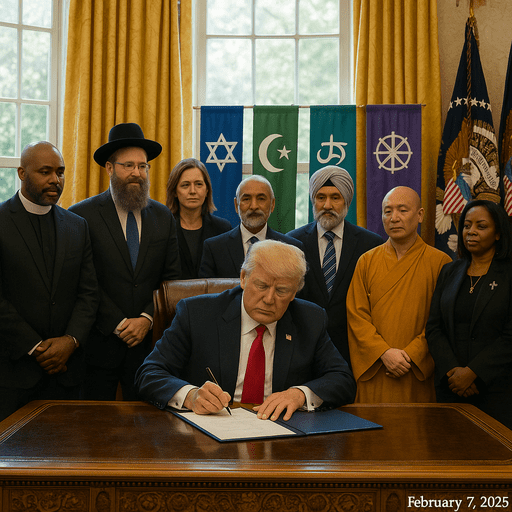On February 7, 2025, President Donald J. Trump signed an executive order to establish the White House Faith Office, a strategic initiative aimed at empowering faith-based entities, community organizations, and houses of worship to better serve families and communities. (whitehouse.gov)
The White House Faith Office is housed within the Domestic Policy Council and is tasked with consulting experts within the faith community to make recommendations to the President regarding changes to policies, programs, and practices that align with American values. The office coordinates with agencies on religious liberty training and identifies and promotes grant opportunities for non-profit faith-based entities, community organizations, and houses of worship. Additionally, it collaborates with the Attorney General to identify failures to enforce constitutional and federal statutory protections for religious liberty. (whitehouse.gov)
The establishment of the White House Faith Office reflects the administration’s commitment to protecting religious freedoms and ensuring that faith-based organizations have a voice in policy-making. By centralizing efforts to support these entities, the office aims to streamline communication between the federal government and religious communities.
However, the creation of this office introduces additional layers of bureaucracy, which may lead to inefficiencies in the implementation of its initiatives. The coordination required among various agencies and the faith community could result in delays and potential overlaps in responsibilities. Moreover, the focus on faith-based organizations may inadvertently sideline secular community groups that also contribute significantly to societal well-being.
The executive order mandates that all federal agencies designate a “faith liaison” within 90 days to facilitate communication and collaboration with the White House Faith Office. This requirement ensures that faith-based entities have direct points of contact within each agency, promoting a more integrated approach to policy development and implementation. (thehill.com)
While the intention is to enhance support for faith-based organizations, the rapid timeline for appointing faith liaisons may pose challenges. Agencies must identify suitable candidates, provide necessary training, and integrate these roles into existing structures, all within a limited timeframe. This expedited process could lead to initial missteps as agencies adjust to the new requirements.
The White House Faith Office is also responsible for advising on policies that enable faith-based entities to participate in federal programs and procure grants. By identifying and promoting grant opportunities, the office seeks to ensure that these organizations have the resources needed to serve their communities effectively. (whitehouse.gov)
However, the emphasis on faith-based entities raises questions about the equitable distribution of federal resources. Secular organizations may perceive this focus as preferential treatment, potentially leading to concerns about fairness and inclusivity in federal funding practices.
In addition to supporting faith-based organizations, the White House Faith Office works in collaboration with the Attorney General to identify and address failures in enforcing constitutional and federal statutory protections for religious liberty. This collaborative effort aims to rectify any lapses in safeguarding the rights of religious individuals and groups. (whitehouse.gov)
While this initiative underscores the administration’s dedication to religious freedom, it also necessitates a thorough review of existing policies and enforcement mechanisms. Such an undertaking requires significant time and resources, which may divert attention from other pressing issues.
The establishment of the White House Faith Office is a practical step toward reinforcing the role of faith-based organizations in American society. By providing a centralized platform for these entities to engage with the federal government, the office aims to enhance their ability to contribute to community development and uphold religious liberties.
As with any new initiative, the effectiveness of the White House Faith Office will depend on its implementation and the collaboration between federal agencies and faith-based organizations. With time and adequate staffing, the office is positioned to make meaningful contributions to the promotion of faith-based rights and values in the United States.
—
Julie Harris covers faith, family, and values-based policy. She holds a journalism degree from Hillsdale College and began her reporting career covering religious liberty cases at the state level. With a strong grounding in moral philosophy and cultural reporting, she brings depth and clarity to complex legislative debates surrounding life and faith.



